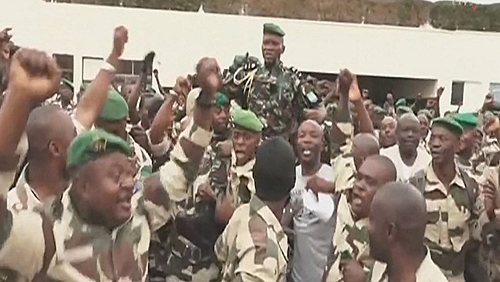
A faction of soldiers overthrew the government of Gabon this Wednesday morning (30), in yet another nationalist coup d’état in a former French colony on the continent this year, and this time the first outside West Africa.
Apparently, the coup has support from the population. Images released by social media accounts show Gabonese civilians in the streets celebrating along with convoys of uniformed soldiers. Soldiers ask the population to avoid looting and acts of vandalism.
As of Wednesday morning, there were no reports of deaths or injuries.
Gabon was governed by Ali Bongo, who, according to official results, had been re-elected for a fourth presidential term in last Saturday’s election (26). In the final count, announced early on Wednesday, Bongo would have received 64.27% of the votes, while the second-placed and main leader of the opposition, Albert Ondo Ossa, had 30.77%. There were no international observers and access to the internet and international radio and TV transmissions were cut off during the investigation, according to the Reuters agency. The deposed government also tried to impose a curfew, which the population did not respect.
The leader of the coup, according to the Gabonese press, is General Brice Oligui Nguema, who until now was the commander of the Republican Guard, responsible for the security of the presidency. Earlier, in a televised speech, Lieutenant Colonel Ulrich Manfoumbi declared: “We, the Committee for the Transition and Restoration of Institutions, have decided to defend peace and put an end to the current regime.”
“In the last three elections in Gabon, the government has restricted the flow of information citing security reasons, but the real reason was to prevent journalists and independent observers from following the poll,” commented Ghanaian political scientist Michael Amoah, visiting professor at the London School of Economics, in an interview with Al Jazeera TV in English this Wednesday morning.
The military announced that the president is under house arrest, suspected of embezzlement of public funds.
Hours later, Ali Bongo’s team released a video in which the ousted politician, speaking in English, claims to be unaware of the regime change. “It’s not happening anything. I ask that you make noise, a lot of noise, ”he said.
Ali is the son of Omar Bongo, one of Gabon’s independence leaders who ruled from 1967 until his death in 2009. He succeeded his father in hastily organized elections and was re-elected in 2016 for a seven-year term. In 2018, he suffered a stroke while visiting Saudi Arabia and it took him ten months to return to his home country.
In 2019, the Gabonese military had already tried to overthrow him, in a barracks that ended in failure and repression of the mutineers.
French-speaking spring
This is the third military-backed regime change in French-speaking Africa in less than a year. In September 2022, officials took power in Burkina Faso, led by Ibrahim Traoré, who claims the legacy of Burkinabé socialist president Thomas Sankara, assassinated in 1987. And, at the end of July, General Abdoulrahmane Tiani overthrew the government in Niger promising redirect the economy of the country, one of the largest exporters of uranium, in favor of the local population.
“This is a French-speaking spring,” commented Ghanaian political scientist Michael Amoah, visiting professor at the London School of Economics, in an interview with Al Jazeera TV in English this Wednesday morning. “There is an anti-French feeling as a dominant factor in these processes, from Mali to Burkina Faso, in Niger and now in Gabon. If we look at the African continent, except for Uganda, which is anglophone, and Equatorial Guinea, which is Hispanic, all countries where there are extended presidential governments are French-speaking, as in Cameroon, Rwanda and Togo, for example. These heads of state stay in power for decades. In Cameroon, the current government has been in place for over 21 years, in Togo it should obtain a fifth term in 2025, and so on. And people are tired of this French influence, which covers up corruption and embezzlement of public money”.
the reaction of Quay d’Orsay, the French Ministry of Foreign Affairs, was immediate and condemned the coup, calling for the results of the elections to be “respected”. French Prime Minister Elisabeth Borne told the press that she is “following with the greatest attention” developments in Gabon.
Interventions
France maintains a military base in the Central African country: Camp Général de Gaulle, near the capital’s airport, Libreville, with 350 soldiers, according to estimates by the Swedish Defense Research Institute.
Gabon holds important oil reserves, but has a low refining capacity. It is one of Africa’s biggest oil exporters, having exported US$3.61 billion in barrels of crude oil in 2021, according to OPEC.
French President Emmanuel Macron was in Gabon in March, taking part in the “protection of tropical forests” summit. On the occasion, he gave a speech stating that the imperialist “age of interventions” in Africa was over. Months later, he refused to recognize Niger’s new government and suspended financial aid to the country.
“What must happen in Gabon now is that the military must govern in transition until there is time to organize a proper election, in which the electoral commission can conduct the election independently and tabulate the results properly”, predicted Amoah.
Editing: Thales Schmidt
Source: www.brasildefato.com.br

